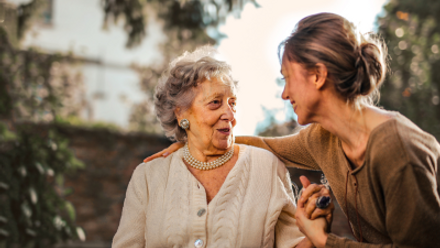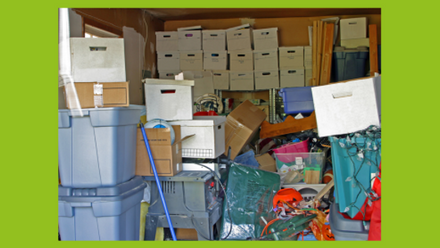Being an Autistic Professional Declutterer
5 minute read
April is Autism Awareness Month, but for APDO member Heather Tingle, every month is Autism Acceptance and Appreciation time.
In today's blog, Heather shares why she feels strongly that Autism Awareness isn’t really needed. Heather says, "we all know Autism exists, but what we need right now is acceptance, inclusion and appreciation. As an Autistic Professional Declutterer and Organiser, I feel honoured to share my story with you."
Just over 9 years ago I was living a very different life from the one I live today. My house was hoarded and I had no idea I was neurodivergent in any way - in fact I had zero clue what neurodivergent even was. Fast forward and a year-long declutter and two late diagnoses of Autism and ADHD later and my home is now my sanctuary, a safe space for me rather than a place I want to run away from. My life is very different too. With that declutter came a change of career and a new way of living.
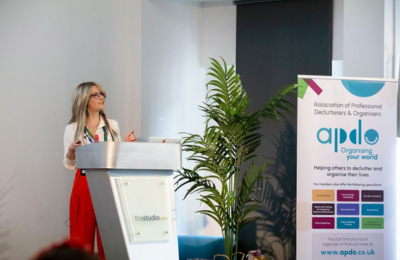
I adore what I do every single day, whether that's speaking on stages such as The Ideal Home Show, recording my podcast or delivering training to APDO colleagues or National Charities - but my favourite part of the job is working in clients’ homes (online with clients all over the world or in-home with clients in South Yorkshire) and watching their hope come back into their eyes. As an autistic I feel emotions very strongly, so celebrating clients’ wins with them, no matter how small, really makes my day!
Being autistic has so many advantages for me as I mainly work with neurodivergent clients. The most frequent compliment I get is that ‘you knew what my brain was thinking’ and that clients feel able to say what they’re thinking with me, no matter how weird it seems. This is because my brain works the same way as theirs. My brain is naturally messy - so my systems work for everyone, as they’ve been tried and tested and have worked for me over 8 years. I realise now that this trait of ‘pattern recognition’ that is listed as an autistic trait but never made sense to me, is what has helped make my trademarked PAVES System*, because I can see that all clients have similar problems and have similar solutions despite their very different circumstances. Being able to see the big picture is what allows me to see how your systems are failing and what strategies we can create together to make your home work for you, rather than exasperating you.
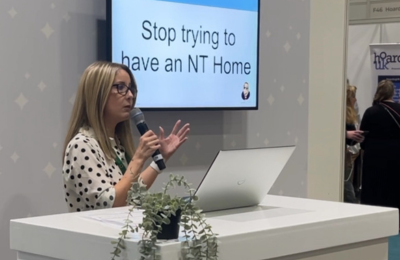
I also understand the limitations that being autistic can bring - struggles with anxiety, overwhelm, over stimulation - which is why I adapt my business for myself and my clients. I’m not a fan of phone calls, so clients can message me via text, WhatsApp, email or voice-note if they prefer. I’m also aware that the unknown is a scary thing when you’re autistic so, for example, ‘just dropping something off at a charity shop’ if you’ve never been before can create a barrier and cause procrastination. I also understand sensory issues, whether that's being requested to not wear perfume on a client session, or finding ways that clients can wash up without getting the ‘ick’ of slimy food on their hands - even if I don’t struggle with those specific sensitivities myself, I totally understand them and work with them.
I’m also aware that body-doubling is a game changer for my clients. This is why my membership is based on body-doubling - the act of working with someone doing the same thing at the same time to make it happen. Often why I’m working with a client isn’t just for my knowledge, but to be a safe person to enable that task you’ve procrastinated on for months or years to actually get done. It’s a real privilege to be the person supporting you making decisions (that you won’t regret later), talking through the memories or the thought processes whilst you decide whether something deserves a spot in your home. I’m used to clients crying on me, and also sharing sometimes quite traumatic or triggering things, as we work through the items together. Emotions aren’t something to run away from but to work through and embrace.
One thing I rarely do is give ‘homework’. That’s because, once I leave, real life happens again! That space and time that was sacred when I was with you has now been taken up by a million other competing priorities and the last thing I ever want anyone to feel is bad because they’ve not managed to do something. Instead we look at ways things can get done without me, where barriers to doing it are removed, or at least lessened, so that you are able to move forward and are clear on the next steps to a decluttered and organised home.
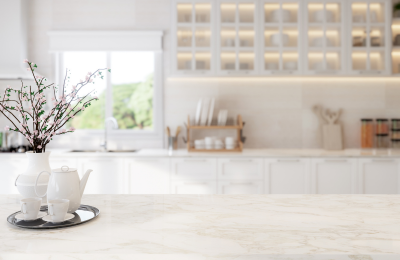
Having a clear and organised home has made such a massive difference to my life and I love helping others achieve that. I’m very open that my mental health has its ups and downs and, when life is feeling harder, it's such a massive relief that I don’t have to battle my home as well as depression or burnout. This means I can concentrate on my wellbeing rather than my home adding to the stress and burden. I notice the impact clutter has on my life and brain - for example at Christmas time when everything is heightened especially, most places are noisy and more unpredictable than usual, my house is also fuller due to decorations and that definitely impacts my mental health. I find my window of tolerance is reduced, my battery lower than normal, so I need to practise better self-care and decompress more at this time, which is something I’m able to do now I live in a decluttered home and everything has a place. When everything goes back to its regular place and my home is clear again, I feel that sigh of relief coming home.

It sounds silly but just opening a drawer and it all being neat rather than an avalanche of stuff threatening to fall makes me smile every single day - and that's something that drives me to help others have that, too. Autistic brains are meant to like order, but I don’t think anyone told my brain that! Executive dysfunction issues had me thinking I was lazy for so many years. I now tell anyone who will listen that living in clutter is the exact opposite of laziness - it takes SO much extra effort to live in a cluttered home. When you have a decluttered home you will realise just how much more time, energy and effort you have, how much easier life is. That’s why I love what I do: I help people get that back.
* PAVES stands for Plan, Action, Vision, Exit Plan, and Strategies and Systems which is something that is needed for a successful declutter that lasts.
If you would like to find a specialist APDO member to support you, use our specialism search tool on our Find an Organiser page. To find out more about Heather, visit her APDO profile here.


